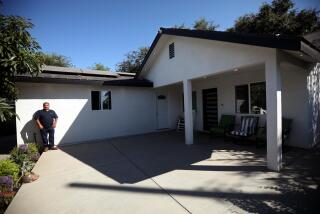Tax Law No Bar to S.D. Real Estate Boom
- Share via
San Diego, unlike much of the nation, could avoid the expected harm to real estate values from the recently passed tax reform package, according to industry experts.
The legislation’s negative effects might be minimized here because of the combination of San Diego’s high population growth rate and restrictions on construction activity, the sources said.
Various sectors of the real estate market will be affected differently by the tax bill.
Single-family housing sales are booming in San Diego, and real estate experts expect this trend to continue as long as the economy here remains healthy and interest rates stay relatively low.
“The tax deduction of owning a house is less beneficial with the decline in the top income tax rate to 28% from 50%,” acknowledged Stan Ross, co-managing partner of Kenneth Leventhal & Co., a Los Angeles-based accounting firm.
On the other hand, Ross added, “More people will qualify to buy homes because they will have more disposable income.”
As a result, most real estate experts expect home prices nationally to at least keep pace with the rate of inflation.
In San Diego, the rate of increase could be even higher because restrictions on growth are raising the price that home builders must pay for developable land.
In contrast to the good news for single-family housing, apartment values both nationally and in San Diego are expected to be hurt by the tax bill.
“There was a bidding war for apartments by syndicators, but this was stopped at the mention of the tax law. Prices have already adjusted (downward) in many cases,” said Rodney W. Wells, partner-in-charge of the tax division for the San Diego office of Arthur Andersen & Co.
Prices may be depressed further this year, Wells said, because many apartment owners are trying to sell their properties to take advantage of the lower capital gains rates while they are still in effect.
The investors who purchased apartments two to three years ago, at the peak of the price escalation boom, will probably be hurt the most, Wells said.
Tax-oriented investors in new apartment projects will experience a 45% drop in after-tax cash flow, according to a research study by Salomon Brothers Inc., the New York-based investment banking firm. The study concluded that buyers will have to pay 16% less for apartments or that rents will have to rise by 19% to compensate for the loss.
The other bad news for apartments is that demand for apartments may slacken as more people buy homes.
In San Diego, there has been a burst of apartment construction in the last few years. Vacancy levels, however, still remain in the 5% range, considered reasonable by most real estate experts.
“There will be a temporary decline in values until supply and demand are more in balance,” said Jerry LaFlamme, managing partner of Kenneth Leventhal’s San Diego office. “When that happens, rents will increase in San Diego.”
Also, real estate syndicators, looking for new products to sell, are likely to turn to selling properties that require a larger cash down payment.
“A little leverage isn’t necessarily bad,” Wells said. “The issue is how much debt you have relative to the value.”
The high vacancy rates in office space nationally and in downtown San Diego have been well-publicized. Competition for tenants has been fierce, with landlords offering free rent and tenant improvement allowances as incentives.
The new tax bill is expected to depress office building values until supply and demand are more in balance.
Construction of office buildings should be moderated because of the inability to raise capital to finance long absorption periods, Ross said. “A project will only be financed if it has a positive cash flow yield,” he said.
The value of industrial buildings and shopping centers will also be hurt by the tax bill.
As the supply becomes tighter over the next few years, rents will rise, and values will increase again.
Overall, one major benefit of the tax bill is that all real estate investors will have to examine projects on an economic basis and not solely as tax shelters. That should prevent some of the construction and price excesses of the past, experts contend.
Another effect of the tax bill is that pension funds, which are not tax-oriented, will probably become even larger players in the real estate market. Foreign investors also are expected to play a more significant role.
As a high-growth area and gateway to the Pacific Rim, San Diego will lure an increasing number of foreign investors, industry analysts said. And, over the long run, their presence will stabilize property values.
More to Read
Inside the business of entertainment
The Wide Shot brings you news, analysis and insights on everything from streaming wars to production — and what it all means for the future.
You may occasionally receive promotional content from the Los Angeles Times.










